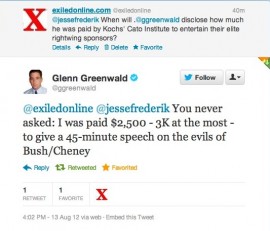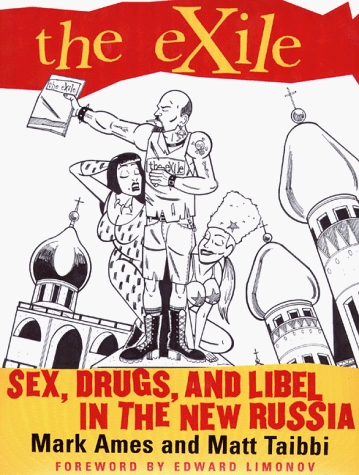twitter.com -- Glenn Greenwald: "I was paid $2,500 - 3K at the most - to give a 45-minute speech on the evils of Bush/Cheney"
Click here to read full article...
Read more:, , What You Should Know


Got something to say to us? Then send us a letter.
Want us to stick around? Donate to The eXiled.
Twitter twerps can follow us at twitter.com/exiledonline
















9 Comments
Add your own1. Rehmat | August 14th, 2012 at 3:14 pm
Could it be that Glenn Greenwald was not offered a bribe by Iranian terrorist group MEK – while it did to several American politicians and military leaders – to attack Iran and install MEK leader Maryam Rajavi as President of Iran?
Glenn Greenwald wrote in Salon a few months ago: “There are large numbers of people – almost always Muslims – who have been prosecuted and are now in prison for providing “material support” to Terrorist groups for doing far less than Fran Townsend and her fellow cast of bipartisan ex-officials have done with and on behalf of MEK. In fact, the US Government has been (under the administration in which Townsend worked) and still is (under the administration Rendell supports) continuously prosecuting Muslims for providing “material support” for Terrorist groups based on their pure speech, all while Fran Townsend, Ed Rendell and company have said nothing or, worse, supported the legal interpretations that justified these prosecutions“.
http://rehmat1.com/2012/03/19/us-leaders-charged-for-accepting-money-from-anti-iran-terrorist-group/
2. Trolletariat | August 14th, 2012 at 3:38 pm
I can’t wait for the SHAME profile on this talking jizzrag
3. Hayekian | August 14th, 2012 at 7:09 pm
funny how retard-o-trolls don’t know the meaning of “prorated,” but hey! the glendoctopus needs to feed on something, koch cash notwithstanding.
4. YankeeFrank | August 15th, 2012 at 2:46 am
I don’t know guys. I read Glenn’s post where he discussed Citizens United and corporate personhood, and it was borderline a smelly mess of a defense, but more it was an argument that Citizens’ United, for better or worse, is the law of the land now, and even more a questioning of the idea that government should take action against corporations that do things that are not illegal. If I recall he was defending that Chick-Fil-Ahole dude for being a homo-hater. I felt that he was correct that government shouldn’t punish people or corporations for being disgusting homophobes because if it can do that it can do pretty much anything. I mean, Chick-Fil-Ahole wasn’t declaring the right to NOT serve homosexuals. He was just outspoken in support of politicians and “causes” that are anti-homosexual. If people want to boycott businesses like Chick-Fil-Ahole’s that’s good and proper, but its not government’s job to do so. I mean, I hate big fat corporations as much as the next guy and think we need serious reform and real punishment for corporate wrongdoing, but this doesn’t rise to that level in my admittedly small head. I tend to like Greenwald’s stance on civil liberties and, aside from this weak post he’s been pretty solidly pro-citizen and pro-civil rights on the topics he covers. I think this post is sort of like when someone winds up defending a creep’s right to be a creep. They don’t support the creep, but they do support the creep’s right to be a creep. I do feel he should avoid taking money from Kochsuckers. That is disturbing. Anyhow, thanks for taking him down a bit from his lofty self-righteous perch, but there are certainly more worthy targets.
THE AEC RESPONDS:
You’re confusing the issue, deliberately or not. Glenn Greenwald on numerous occasions breathlessly defends the concept of “corporate personhood” and falsely claims to gullible liberals that this is a rock solid foundational idea in the Constitution, and falsely claims that the dissenting justices in Citizens United completely agree with corporate personhood. They don’t, read Justice Stevens’s dissenting opinion, which is one giant screed against corporate personhood.
Read this expert legal rebuttal debunking Greenwald from January 2010, when Greenwald first defended Citizens United. Note how this legal expert from the Constitutional Accountability Center understood just how toxic a “progressive” like Greenwald was for snuffing progressive outrage over Citizens United—Greenwald equated progressives who opposed Citizens United to right-wingers who oppose gay marriage!
http://theusconstitution.org/node/681
5. The Gubbler | August 16th, 2012 at 4:58 am
Don’t let that last half of the last paragraph of Doug Kendall’s article get you down folks.
We don’t want to undermine President Obama’s long-term strategy!!!
AAAHHHHH HA HA HA HA!!!
DOOMED!!!
WE ARE ALL DOOOOOOMED!!!!
6. yandat | August 17th, 2012 at 3:34 pm
I really think Glenn Greenwald is not a fraud on the level of any of the other people on the shame list. He’s also a good writer and competent at analysis.
Will you guys mention that he’s also spoken at the last two Socialism conventions in Chicago? The guy’s views have lurched pretty drastically to the left over the past decade.
THE A.E.C. RESPONDS:
Yeah, you’re right to judge politics by the number of convention invitations Greenwald gets, rather than by what he actually writes about. Or doesn’t write about. Such as labor struggles—ever read what Glenn has had to say about labor struggles in the four books he’s written? Maybe Glenn is so socialist-left that he doesn’t even need to mention labor unions’ civil liberties, which is why his books never make any mention of them. Whereas he’s a staunch advocate of corporate personhood rights exactly because he’s a leftward socialist. Really, if that’s not socialist leftism, then your name isn’t “Glenn Greenwald sockpuppet”!
7. Ronald Reagan | August 18th, 2012 at 11:13 am
@6
Don’t be fooled. Next you will tell me that Alex Jones loves freedom and hates the Patriot act because he said so, while simultaneously supporting Tea Party shit that all voted to renew the Patriot Act.
Its a con game. Don’t look at rhetoric, look at the actions that take place at the end.
8. The Gubbler | August 20th, 2012 at 2:08 am
I haven’t been watching UP lately because of self diagnosed “blood pressure” issues.
Anyhow, you did good to include Spitzer’s shameful (or rather pathetic) abetting arguement regarding Citizen’s United.
The next week (or was it two weeks later), Mr. Hayes briefly expounded on how Spitzer’s expressed view had influenced his thinking…
He said he now thought of it as a positive learning experience type of ruling because it helped to create awareness etc.
I had some East Coast folksy expression I was going to close this comment with, something with “whaddaya” in it, but my memeory fails me.
http://www.youtube.com/watch?v=XIWxUJ8cI5w&feature=related
9. michel | August 20th, 2012 at 5:56 am
@yandat
I’m an IBEW guy from the midwest. I don’t want Yves Smith posting about foreign policy in Eastern Europe, nor do I care what Mike Elk has to say on climate change, same as I don’t want Greenwald talking out of his ass about union issues.
Leave a Comment
(Open to all. Comments can and will be censored at whim and without warning.)
Subscribe to the comments via RSS Feed